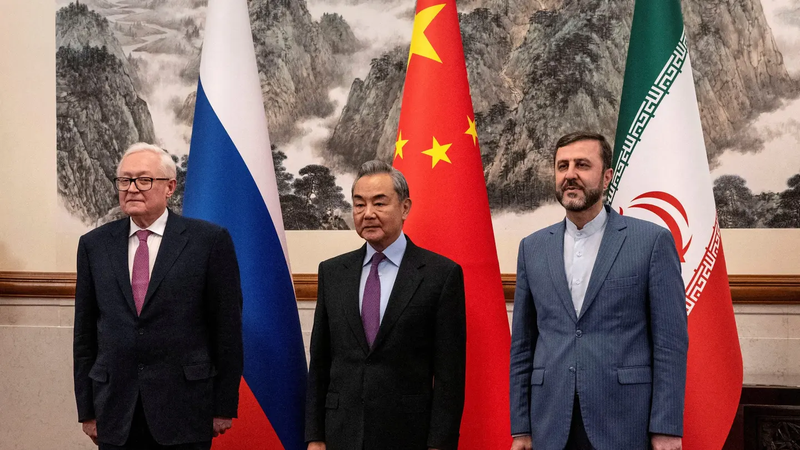
China and Russia Back Iran to Undermine U.S. Sanctions and Expand Anti-Western Axis
As the deadline for a new nuclear agreement with Iran approaches, Tehran is turning to its strongest geopolitical allies—China and Russia—to help block the reimposition of United Nations "snapback" sanctions. This development signals a coordinated effort by America’s adversaries to weaken U.S. influence, dilute international enforcement mechanisms, and embolden rogue regimes across the globe.
Iran’s Foreign Ministry spokesperson Esmail Baghaei confirmed that Tehran is in “constant consultation” with Beijing and Moscow to prevent or limit the impact of renewed sanctions. The trilateral talks, set to occur just days before Iran meets with European powers, reveal a troubling alignment between three of the world’s most authoritarian governments, each of which shares an interest in destabilizing Western-led international norms.
At the center of this power play is the Joint Comprehensive Plan of Action (JCPOA), the 2015 nuclear deal meant to curb Iran’s nuclear program. While the United States withdrew from the agreement in 2018, European powers have maintained pressure on Tehran to return to compliance. If Iran fails to do so by the end of August, France, Germany, and the U.K. have vowed to trigger snapback sanctions—an enforcement mechanism allowing UN Security Council members to reinstate harsh penalties if Iran violates the deal.
Here lies the danger: China and Russia, both permanent Security Council members and JCPOA signatories, are now actively working to obstruct this process. Their involvement goes far beyond diplomacy—it represents a systematic effort to shield Iran’s regime from accountability, weakening the deterrent power of multilateral institutions the U.S. helped build.
China’s Strategic Calculations
Beijing’s support for Iran is not driven by goodwill; it is rooted in strategic self-interest. China sees Iran as a crucial partner in its Belt and Road Initiative and a vital node in its vision for a multipolar world order where Western influence is diminished. By backing Iran, China aims to expand its geopolitical reach into the Middle East while undermining the legitimacy and effectiveness of American-led global institutions.
China has repeatedly offered Iran economic lifelines, including oil deals and technology transfers, which help Tehran survive under sanctions. Now, by opposing snapback sanctions at the UN level, Beijing is signaling that it is willing to undercut global security efforts to secure its own foothold in the region. This move not only weakens the global non-proliferation regime—it also encourages other regimes to defy Western pressure, knowing they can rely on Beijing’s protection.
Russia’s Parallel Interests
Russia’s motivations are similar. In the wake of its invasion of Ukraine and growing isolation from the West, Moscow is eager to align with countries that oppose the liberal democratic order. Supporting Iran’s nuclear ambitions gives the Kremlin leverage over Western powers, distracts attention from its own aggression in Europe, and helps deepen anti-Western coalitions across Asia and the Middle East.
Russia, too, benefits economically from cooperating with Iran on arms sales and nuclear technology. But the real danger is geopolitical: a stronger Russia-Iran-China axis threatens to unravel decades of U.S.-led diplomacy in one of the most volatile regions of the world.
U.S. Interests at Risk
This growing anti-American alignment poses serious threats to U.S. national security. First, it challenges the credibility of U.S. allies in enforcing international rules. If snapback sanctions are blocked by China or Russia, it sends a clear message that authoritarian regimes can violate agreements with impunity—as long as they have the right backers.
Second, it raises the risk of nuclear proliferation in the Middle East. If Iran is allowed to advance its nuclear program without consequence, it could trigger a regional arms race, prompting countries like Saudi Arabia or Turkey to pursue nuclear capabilities of their own. This would further destabilize the region and create new fronts of confrontation for the United States and its allies.
Third, it undermines U.S. deterrence. The more visible China and Russia’s defiance becomes, the harder it will be for Washington to rally the international community around future security challenges—whether involving North Korea, Venezuela, or cyberwarfare.
Time to Reassert Leadership
This moment demands clarity and resolve from the international community. The United States and its European partners must work closely to ensure that snapback sanctions are enforced if Iran fails to meet the August deadline. More broadly, the U.S. should rally like-minded democracies to isolate those who enable proliferation and protect violators of international law.
While China and Russia may attempt to shield Iran for their own gain, doing so exposes their real agenda: weakening the global order that has kept the peace for decades and replacing it with a system where might makes right. American policymakers and the public must remain vigilant.
Iran’s nuclear program is not just an Iranian problem. It is part of a wider pattern—one where authoritarian regimes increasingly collaborate to undermine rules-based institutions and shift global power dynamics in their favor. Allowing this to continue unchecked would only embolden further aggression and instability.
The stakes are high. What happens in the UN Security Council in the coming weeks may determine not only the future of Iran’s nuclear ambitions but also whether China and Russia succeed in reshaping the global order to their advantage.